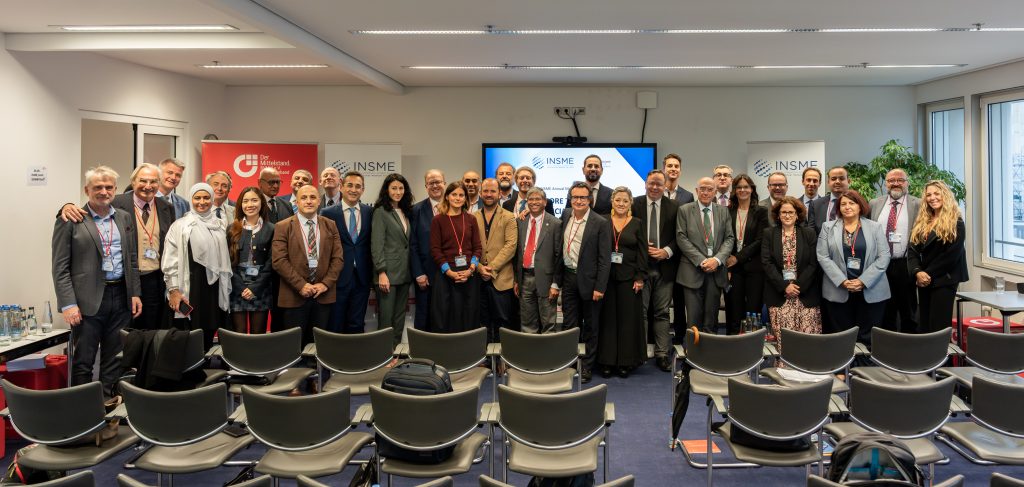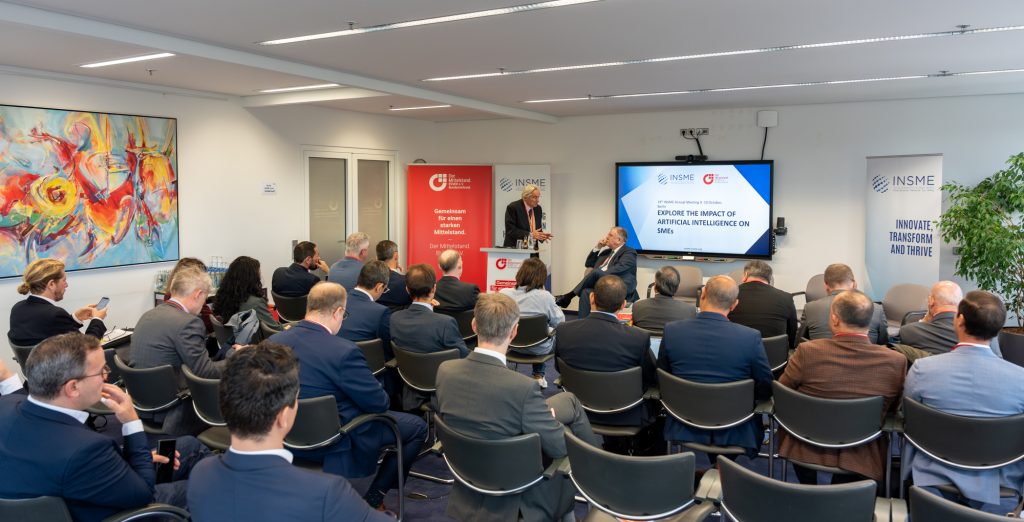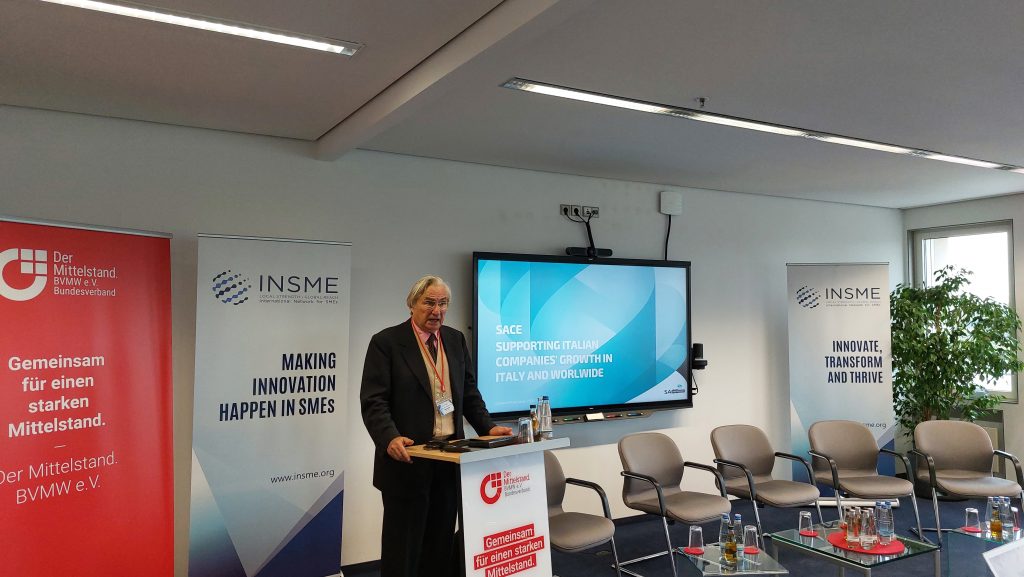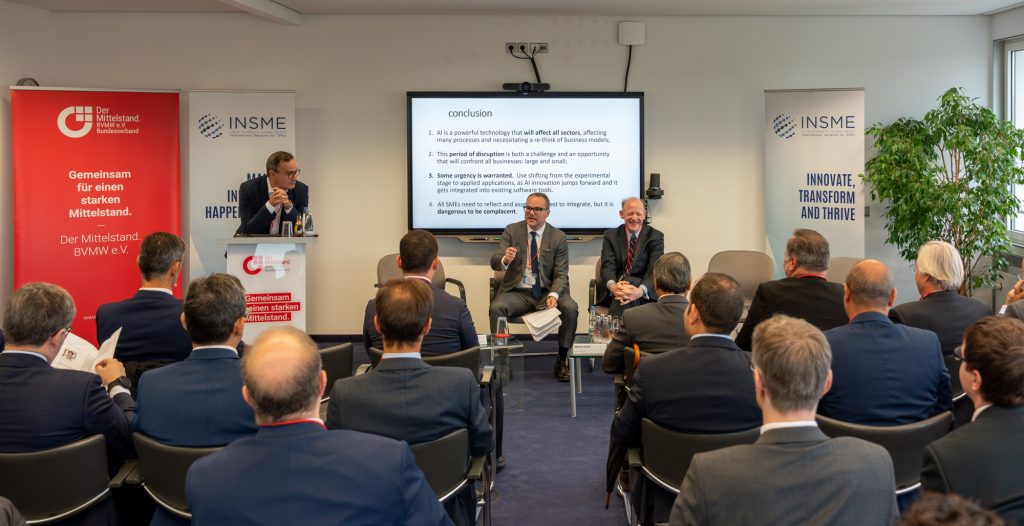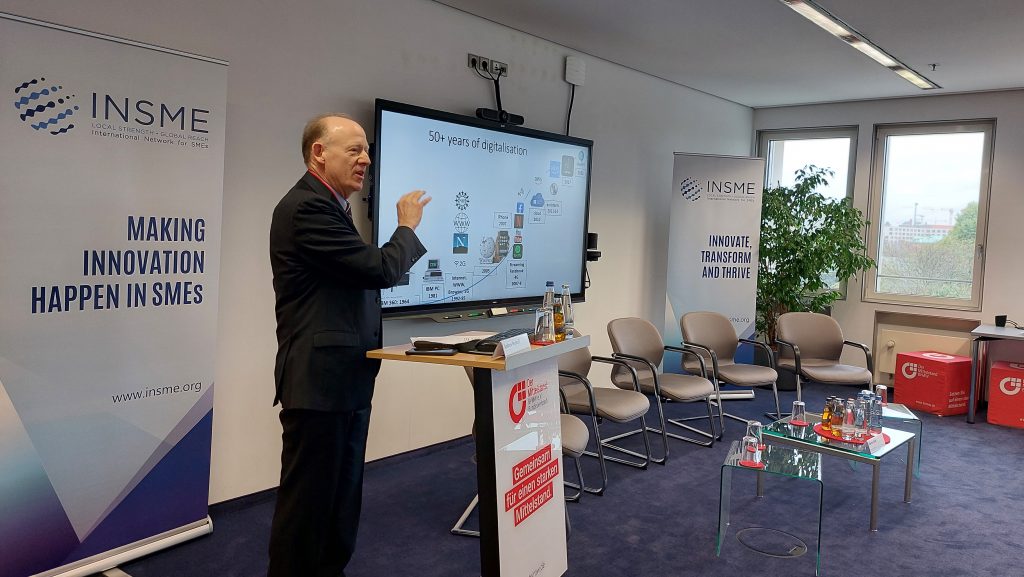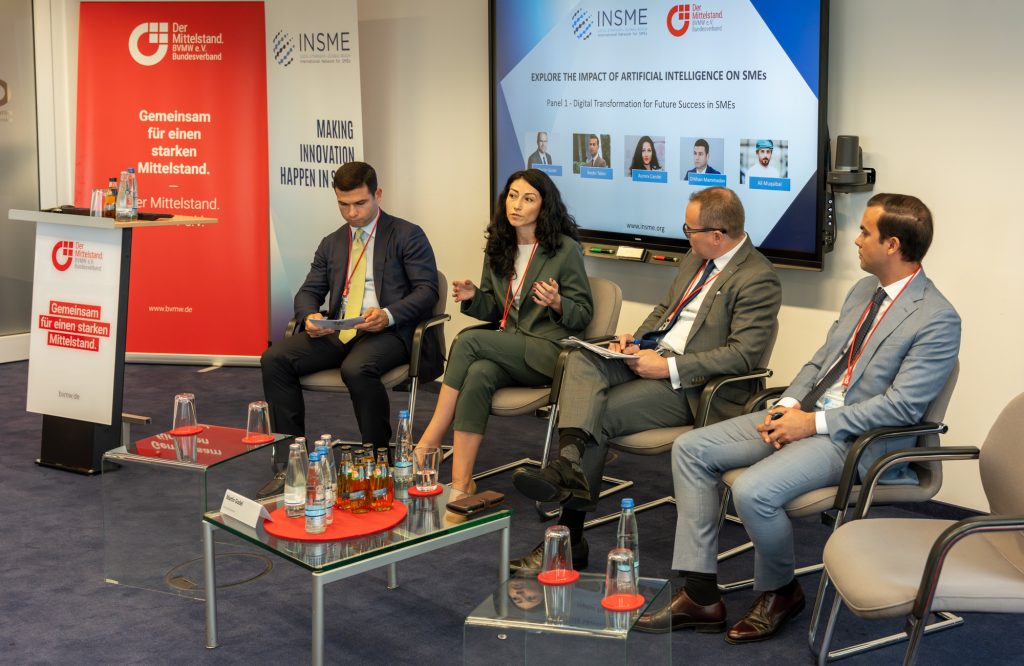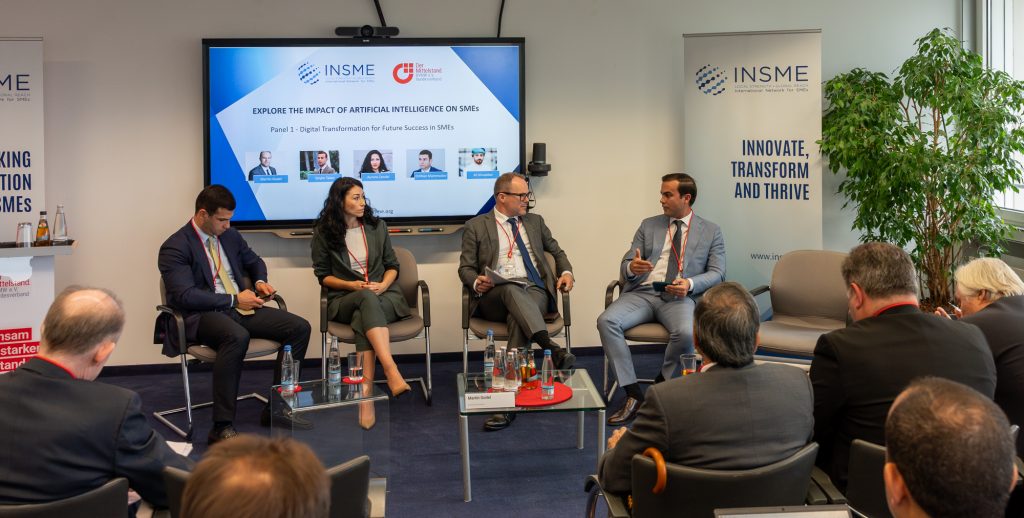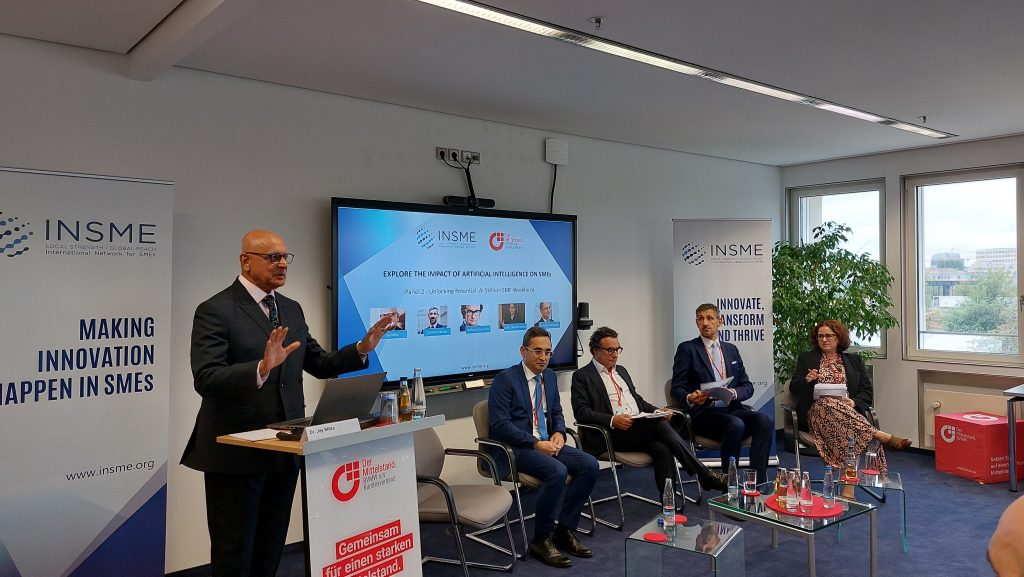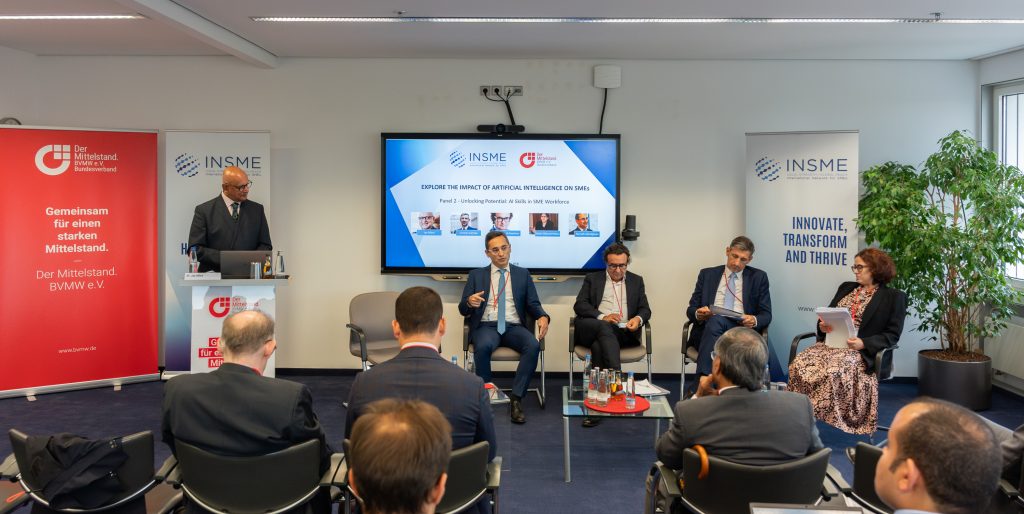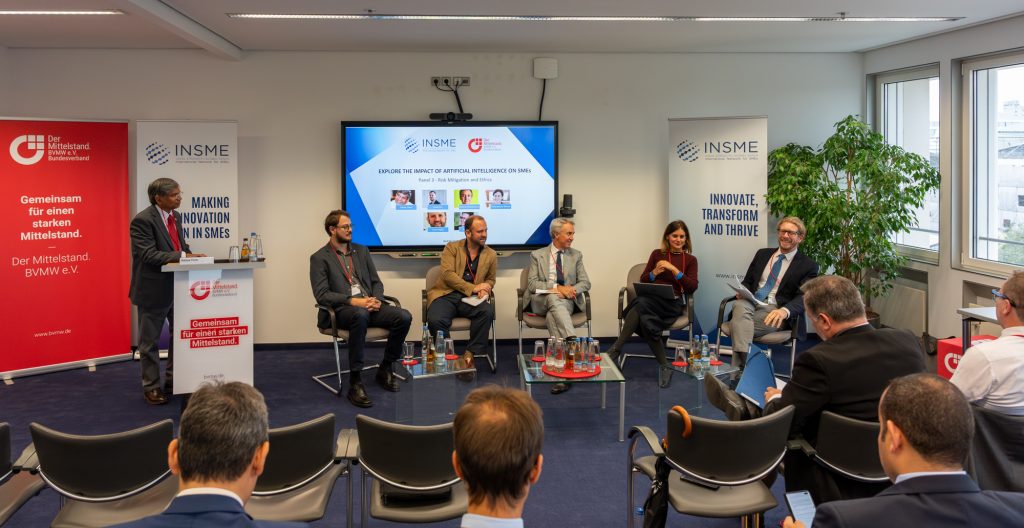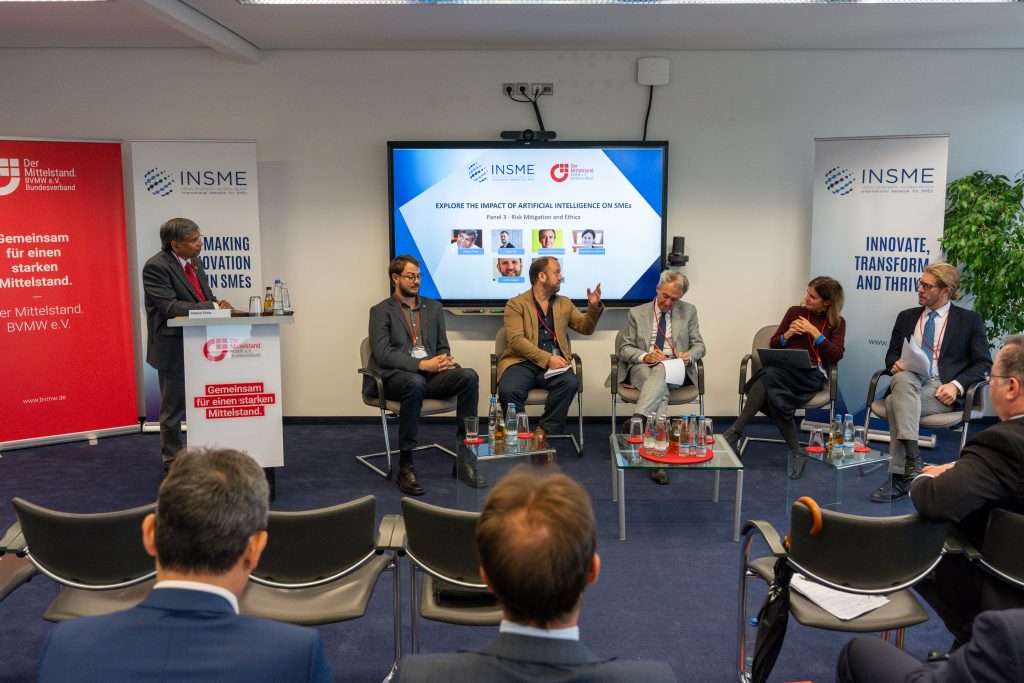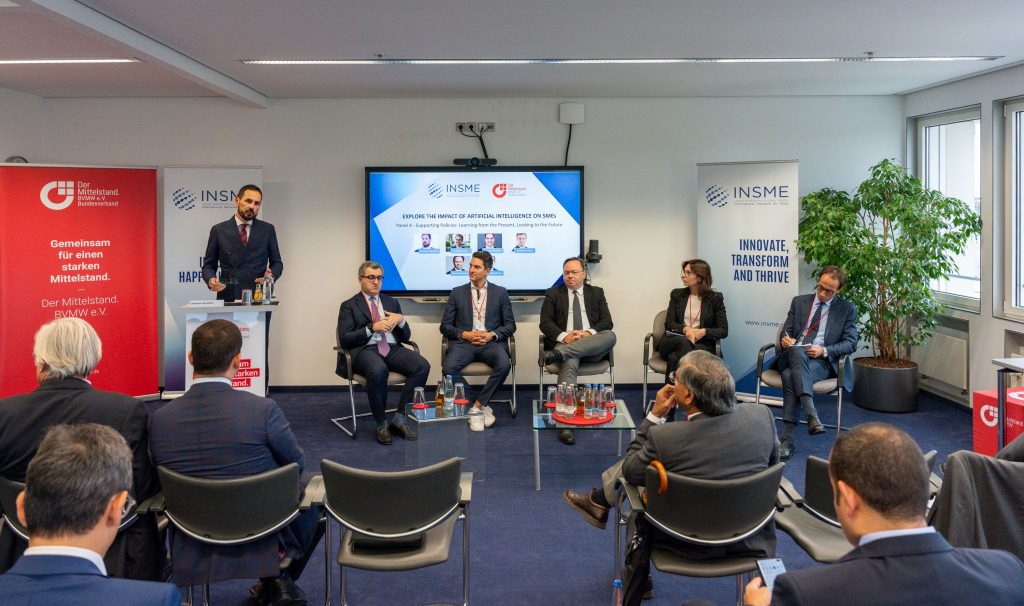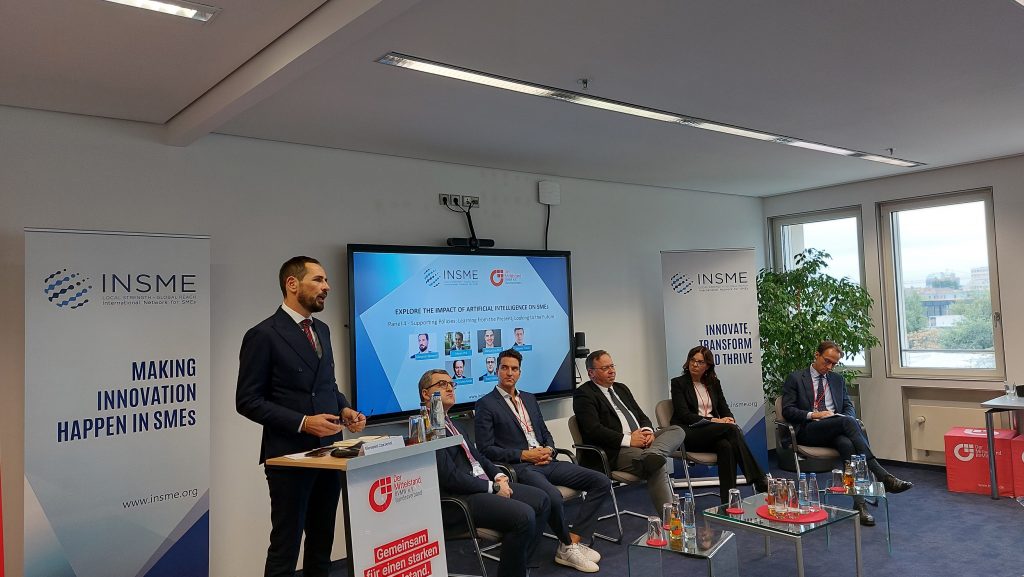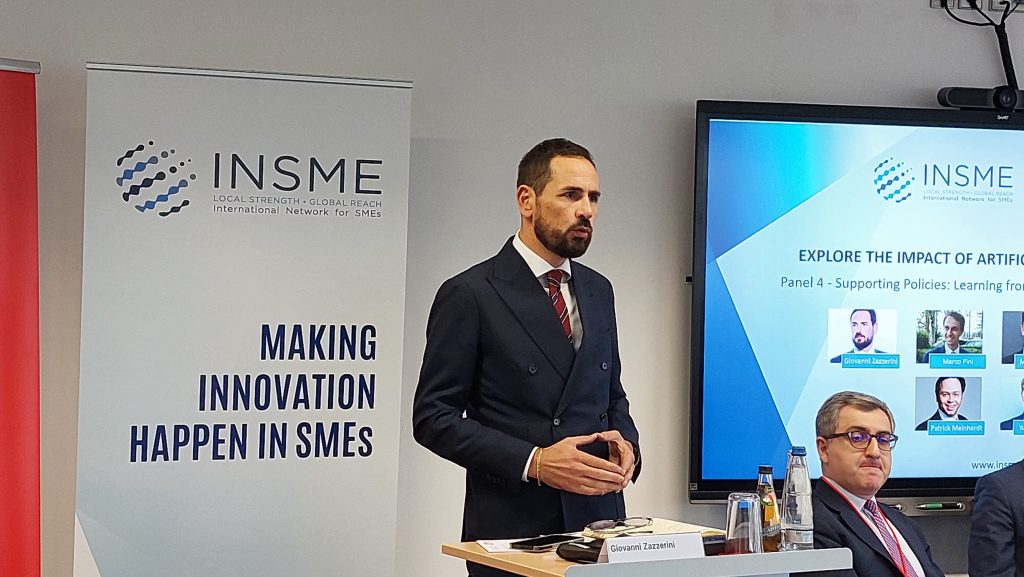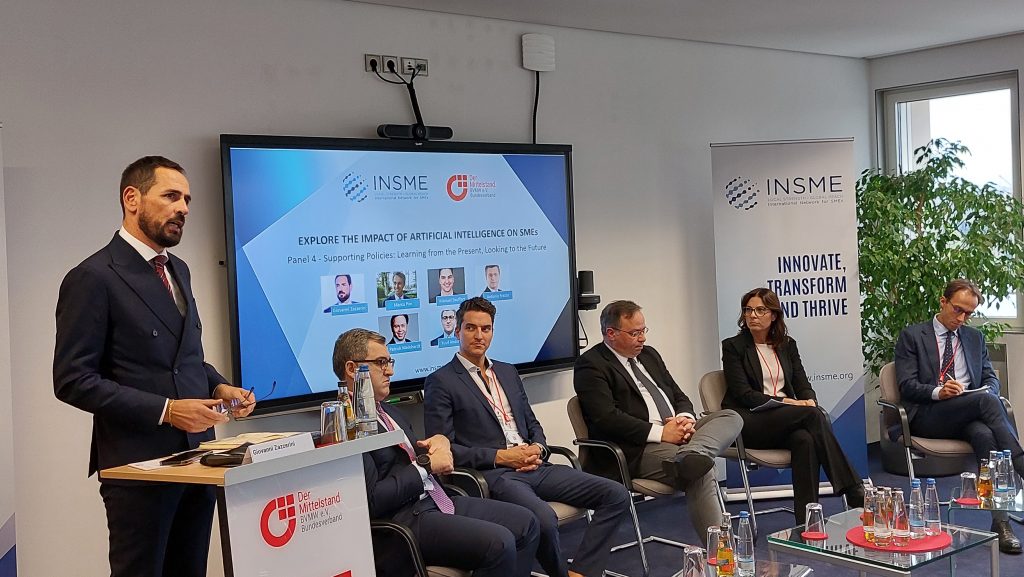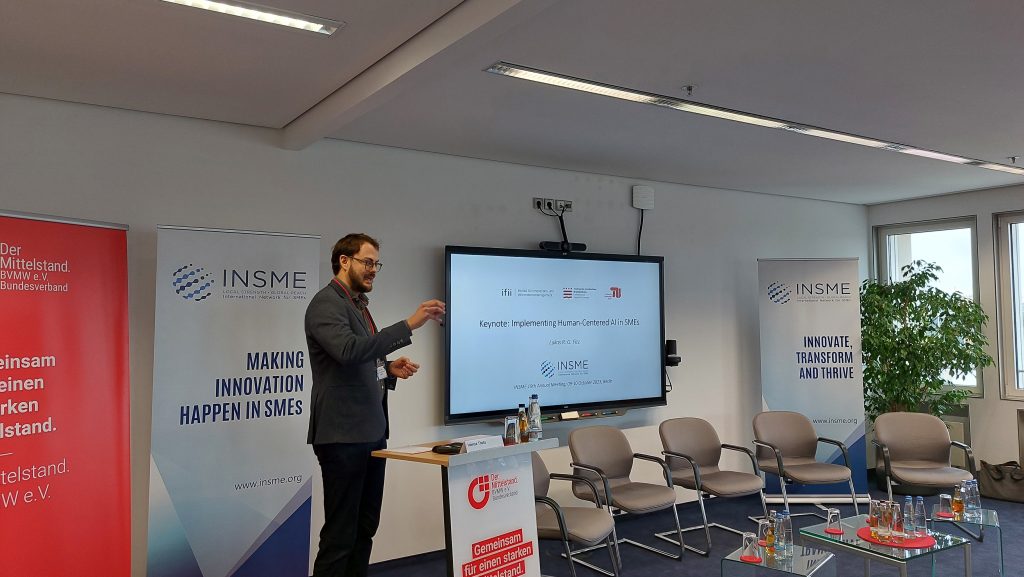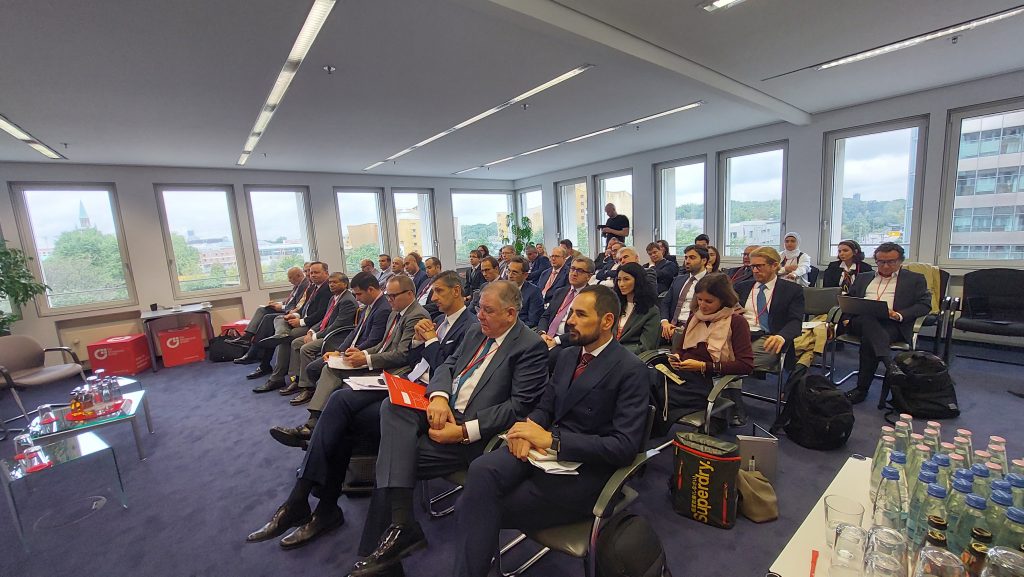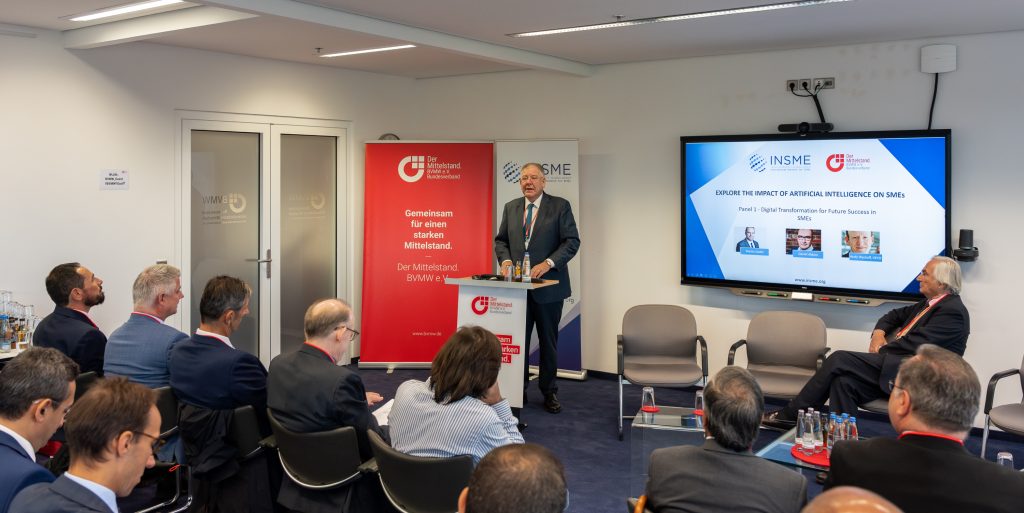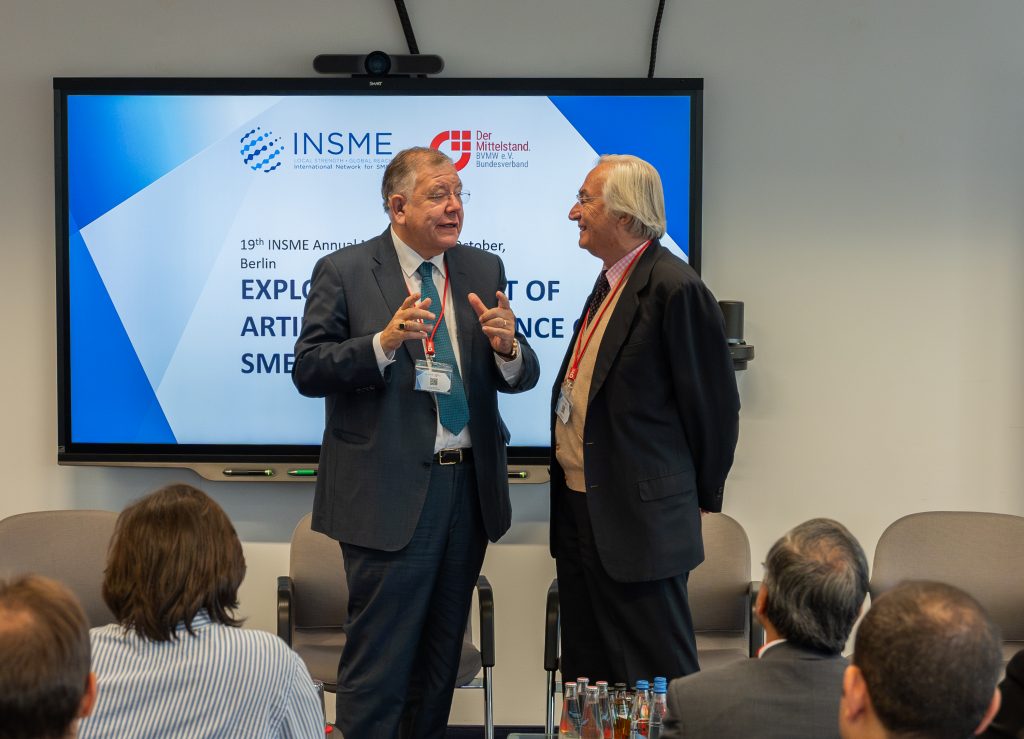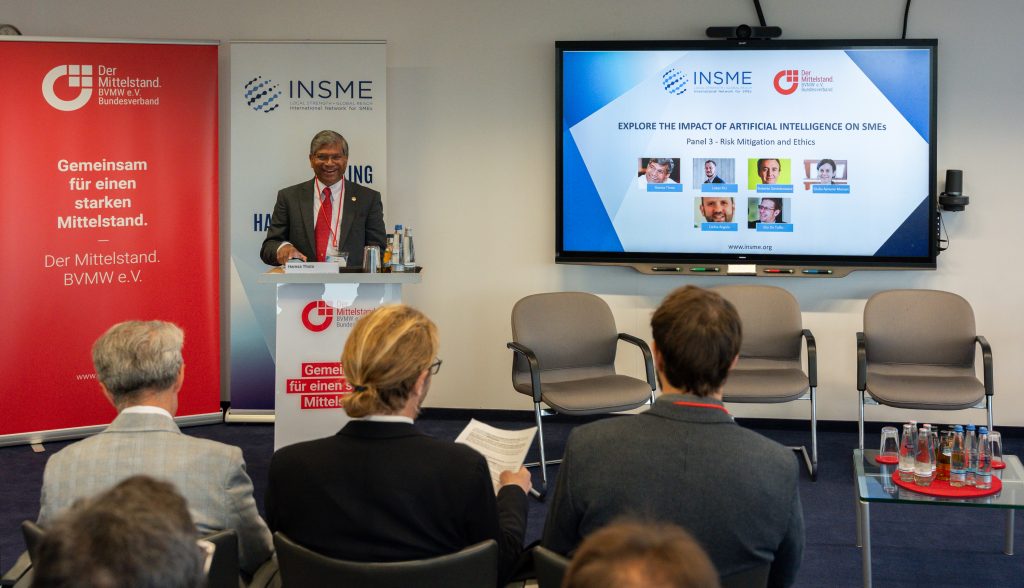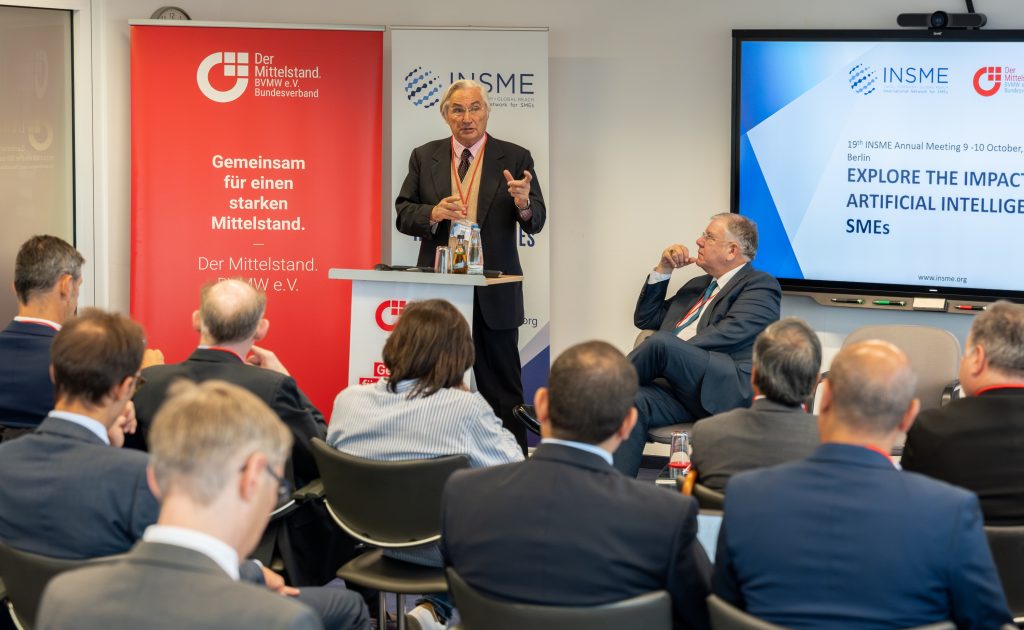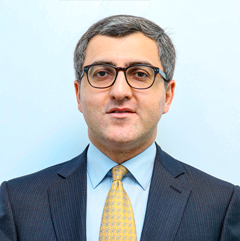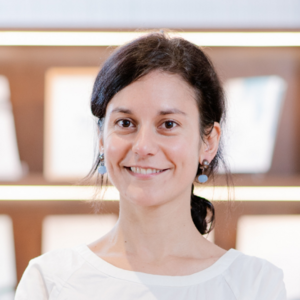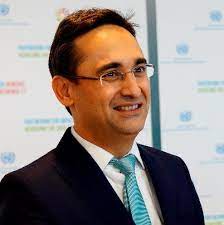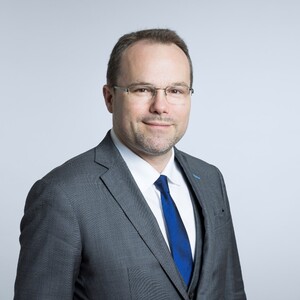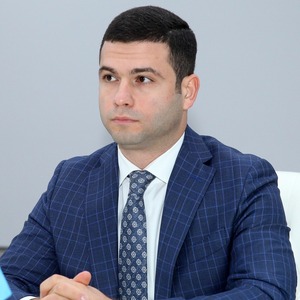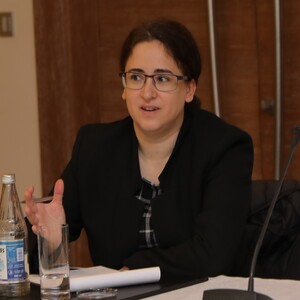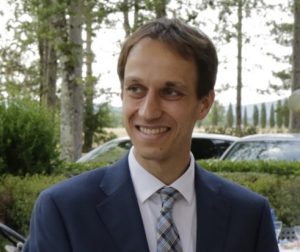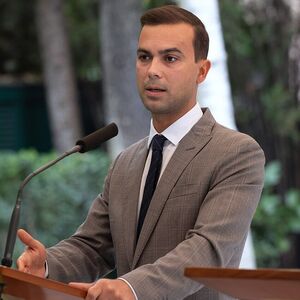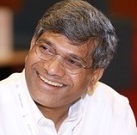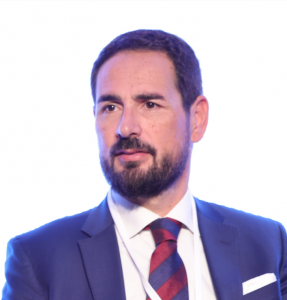19th INSME Annual Meeting
Explore the Impact of Artificial Intelligence on SMEs
CONFERENCE THEME
SMEs play a pivotal role in driving economic growth and innovation across various sectors around the world. In recent years, the rapid advancements in Artificial Intelligence (AI) technologies have presented SMEs with unprecedented opportunities to enhance their business and competitiveness. AI is a crucial topic for the current landscape; this is exemplified by the EU, which is currently focusing on the AI Act, a legislative framework to regulate the development, commercialization and use of AI in accordance with European constitutional values and rights.
The 19th INSME Annual Meeting aims to explore the intersection of SMEs and Artificial Intelligence, examining on the one hand how the adoption of AI can advantage businesses, and the workforce, and contribute to their long-term success, on the other the related risks and adoption challenges for SMEs.
According to the latest statistics, the global AI market is projected to reach a value of $126 billion by 2025, driven by the increasing demand for AI solutions across all industries. However, despite the massive potential, there is a significant gap in the adoption of AI technologies among SMEs. Data indicates that only a tiny fraction of SMEs have integrated AI into their operations, primarily due to various challenges, including limited resources, lack of awareness, and perceived complexity.
It is crucial to investigate the open issues of AI in order to have a complete picture of this breakthrough: high implementation costs, dependence on third-party providers, and the risk of employees losing their jobs are only some of the crucial points that SME actors might be sceptical of. Nonetheless, the benefits of AI implementation in SMEs are substantial. Studies have shown that AI-powered tools and applications can significantly improve productivity, efficiency, and decision-making processes.
Feel free to read Prof. Jay Mitra’s Issue Paper “AI Revolution: Transforming Industries and Empowering SMEs for Future Growth” to delve further into this topic, as it was developed exclusively for INSME’s Annual Meeting.
This event will focus on the perks and risks of implementing AI in a business, giving SMEs the tools to navigate this new landscape with up-to-date knowledge and relevant preparation. Among others, the following dimensions will be presented and discussed:
- Automation and productivity: AI can automate repetitive tasks, freeing up employees’ time to focus on more strategic and value-based activities. This can lead to increased productivity and operational efficiency within SMEs, which has an impact on employee well-being and methodology innovation.
- Competitive advantage: Implementing AI technologies can help SMEs gain a competitive edge by enabling them to analyze large volumes of data, identify patterns, and extract valuable insights. This can aid in making data-driven decisions and predicting customer behaviour, leading to more targeted marketing and improved customer satisfaction. However, it is essential to note that AI is not empathetic and cannot read a client’s facial expressions, jokes, or voice inflexion; therefore the link with human workers must be used to create meaningful interactions in business.
- Cost considerations: While AI implementation may require initial investments, the long-term benefits can outweigh the costs. For instance, AI can optimize inventory management, reduce waste, and enhance supply chain efficiency, resulting in cost savings. Cost analysis and knowledge of these new tools will be crucial for businesses in 2023.
- Skill requirements: Emphasizing the importance of having skilled individuals who can effectively utilize digital technology rather than just understanding its technical aspects. In this sense, adopting AI technologies may require SMEs to acquire new skills or hire specialized talent. However, various user-friendly AI tools and platforms are already easily available, that cater specifically to SMEs, requiring minimal technical expertise for implementation such as ChatGPT, Otter AI, etc. It is also important to integrate the digital revolution into the education system, not only in academic education but also in vocational training. This will lead to a substantial global digital revolution in vocational training to address the lack of emphasis on teaching systems and financial education in many states, which is crucial for SMEs.
- Ethical and legal implications: SMEs must be mindful of ethical considerations related to AI, such as ensuring transparency, fairness, and accountability. Additionally, they should comply with relevant data protection and privacy regulations when handling customer data and be mindful of possible biases or discriminatory factors in certain tools. However, excessive regulations hinder innovation and impede results. A more balanced and rational approach would be reasonable to emphasize the positive aspects of technology and digitalization, fostering trust and open discussions.
- Risk Mitigation: AI can help SMEs identify potential risks and mitigate them proactively. For instance, AI-powered algorithms can detect anomalies in financial transactions, cybersecurity threats, or production processes, allowing SMEs to take corrective actions promptly and minimize damage.
- Scalability: AI systems can be easily scaled up or down to match business needs. As SMEs grow, AI can adapt and accommodate the increased demands, ensuring that processes remain efficient and effective.
- Sustainability: AI can employ a sustainable approach that considers citizens at all levels. The shift in perspective encompasses a broader view that prioritizes people and their well-being in all aspects, emphasizing the significance of considering ESG goals.
BVMW – The Mittelstand
BVMW is the German Association for Small and Medium-sized Businesses, a politically independent association that caters to all commercial branches and professions and represents the interests of SMEs in politics, with administrative authorities, with trade unions and with major companies, serving around 3.3 million individual enterprises in all – representing realities that are the backbone and impulse of the German economy.
Operatively, BVMW provides assistance to its members in strengthening their status, striving for an improved economic and political framework at national as well as at regional and local levels with over 300 offices all over Germany. BVMW influences legal bills and regulations through lobbying activities and provides its members with a platform for public relations. With more than 2,000 conferences and seminars each year, BVMW offers its members excellent opportunities to acquire information on the new legislature and government regulations, as well as to establish and expand business contacts.
VENUE
Der Mittelstand BVMW – Potsdamer Str. 7, 10785 Berlin, Germany
AGENDA
N.B. All times are indicated in CEST, please check your time zone here.
The working language of the conference will be English.
Conference Program – Monday 9 October 2023
9:00 – 10:00 Registration and Welcome Coffee
10:00 – 10:30 Welcome addresses and opening speeches
- Christoph Ahlhaus, CEO, BVMW – German Mittelstand, Germany
- Sergio Arzeni, President, INSME, International Network for SMEs, Italy
10:30 – 11:45 Session 1. Digital Transformation for Future Success in SMEs
In the fast-paced and highly competitive global market, SMEs face a myriad of challenges. To stay relevant and achieve sustainable digital transformation, these companies would benefit by adapting and embracing the advancements brought forth by technology. AI has revolutionized the way businesses operate, enabling them to make data-driven decisions, automate processes, and unlock new opportunities for innovation. SMEs, often constrained by limited resources and manpower, can harness the power of AI to level the playing field and compete with larger enterprises. This session explores the significance of AI-driven digital transformation and its potential to reshape the future of SMEs, with tangible evidence and success stories of AI implementation that have a connection with the human element, workers are people and innovation walks on their legs rather than chips.
The discussion will focus on the following issues:
- How can AI technologies be effectively leveraged by SMEs to drive digital innovation and enhance their competitiveness?
- What are some successful use cases or best practices of AI implementation in SMEs that have resulted in significant digital innovation and business growth?
Chair: Martin Godel, Chairman, SECO, Switzerland
Keynote speeches:
- Andrew Wyckoff, European University Institute, Florence
- Daniel Abbou, Managing Director, German AI Association, Germany
Panel discussion with:
- Boyko Takov, CEO, Agency for SME Promotion, Bulgaria
- Elena Aurora Candel, Director for SME, Ministry of Economy, Romania
- Orkhan Mammadov, Chairman of the Board, Small and Medium Business Development Agency of the Republic of Azerbaijan, Azerbaijan
11:45 – 13:00 Session 2. Unlocking Potential: AI Skills in SME Workforce
In today’s rapidly evolving business landscape, SME managers, CEOs and decision-makers are increasingly recognizing the significance of AI skills within their workforce. As technology continues to reshape industries, SMEs are embracing artificial intelligence as a powerful tool to gain a competitive edge and integrate this with their employees.
Embracing AI skills in the SME workforce not only enhances productivity and accuracy but also allows businesses to unlock new avenues for growth and innovation, as well as employee wellbeing so that the human capital can focus on creative or strategic tasks instead of repetitive and tedious ones. While adopting AI technologies may seem to necessitate SMEs to acquire new skills or hire specialized talent, various user-friendly AI tools and platforms are available requiring minimal technical expertise for implementation such as ChatGPT, Otter AI, Canva AI features (after their latest update), Simplified (for PowerPoint presentations and graphs). Human capital and AI must interact and never substitute one another.
The discussion will focus on the following issues:
- How can SMEs ensure a smooth transition and upskilling of their employees to adapt to the changing global market?
- How can SMEs access and acquire the necessary AI skills and expertise to implement and manage AI projects effectively? What are the available resources and support mechanisms?
Chair: Prof. Jay Mitra, Founder IEF, Essex University Business School, UK
Panel discussion with:
- Cristian Camisa, President, CONFAPI, Italian Confederation of SMEs, Italy
- Andrea di Anselmo, President, META Group, Italy
- Stella Oikonomitsiou, Advocator, Enterprise Greece SA, Greece
- Farrukh Alimdjanov, Industrial Development Officer, UNIDO, Austria
13:00 – 14:30 Networking Lunch
14:30 – 15:45 Session 3. Risk Mitigation and Ethics
While powerful and effective, AI implementation in SMEs presents several risks and potential disadvantages that must be addressed for successful integration. SMEs must be mindful of ethical considerations related to AI, such as ensuring transparency, fairness, and accountability. Additionally, they should comply with relevant data protection and privacy regulations when handling customer data and be mindful of possible biases or discriminatory factors in certain tools. Furthermore, AI could create a “mixed reality” where people interact with each other in real-time through avatars. This restructures the current business environment in many ways such as training and skills acquisition through AI, gamification technologies, and more. A large issue with these newer technologies is that although they may not be developed by larger companies, the larger companies still control them. The problem has not been addressed as small firms remain isolated. To mitigate these risks, SMEs must prioritize cybersecurity measures, invest in AI training and resources, undergo legal preparation, and navigate ethical dilemmas. By addressing these risks before employing AI tools, SMEs can maximize the benefits of implementation while minimizing potential drawbacks.
The discussion will focus on the following issues:
- What are the regulatory and legal aspects that SMEs need to be aware of when deploying AI solutions? How can they ensure compliance with relevant regulations and protect themselves from potential legal risks?
- SMEs may rely on third-party vendors for AI solutions, exposing them to risks such as vendor lock-in, service interruptions, or loss of intellectual property. How can SMEs mitigate risks when it comes to legal or ethical issues?
- How can SMEs manage the potential biases and limitations of AI algorithms and ensure fairness and transparency in their AI applications?
Chair: Hamsa Thota, Founder and President, IBD Innovation Business Development Inc., Georgia, USA
Keynote speech:
- Lukas Fitz, TU Berlin and Brandenburg University of Applied Sciences, Germany
Panel discussion with:
- Carlos Angulo, Judicial Director, PROPAIS, Colombia
- Roberto Santolamazza, Director, t2i, Italy
- Giulia Ajmone Marsan, Director of Strategy and Partnerships, ERIA, Indonesia
- Elio De Tullio, Founder and Managing Partner, De Tullio & Partners, Italy
15:45 – 17:00 Session 4. Supporting policies: learning from the present, looking to the future
To support technological advancement, governments have introduced policies aimed at encouraging AI adoption in SMEs. This panel will analyse pre-existing policies and lessons learned in the field. Supporting policies for AI is crucial for their growth and competitiveness. However, the journey towards widespread AI adoption faces persistent struggles, including limited awareness, financial constraints, and data-related obstacles. Policymakers, industry leaders, and academia must collaborate to address these challenges effectively, providing tailored solutions and resources to enable SMEs to fully embrace the potential of AI in their operations.
The discussion will focus on the following issues:
- What are some successful examples of AI policies or initiatives that have specifically targeted SMEs and yielded positive outcomes?
- How can policymakers foster international cooperation and alignment in AI policies for SMEs to ensure consistency and avoid creating barriers to global trade?
- How can AI policies for SMEs adapt and evolve in response to the rapidly changing technological landscape and emerging ethical concerns?
Chair: Giovanni Zazzerini, Secretary General, INSME, Italy
Panel discussion with:
- Marco Pini, Senior Economist, Unioncamere, Italy
- Manuel Seuffert, Director, IMP³ROVE, Germany
- Simona Vultaggio, Manager of Education, Business Promotion, SACE, Italy
- Patrick Meinhardt, ESD Board Member, Germany
- Yusif Abdullayev, Acting Executive Director, Export and Investment Promotion Agency of the Rep. of Azerbaijan, Azerbaijan
17:00-17:30 Summary of the outcomes and closing remarks
19:00 – 22:00 Gala Dinner – Käfer Restaurant (Bundestag)
INSME General Assembly – Tuesday 10 October 2023
10:00 – 11:30 INSME General Assembly (Members Only)
Members of the General Assembly are informed about ongoing and future activities, projects and achievements, including the INSME 2022 financial statements and the forecast for 2023. Delegates share updates about their projects and initiatives and new members introduce themselves and presentation of the IP4SME project. The project aims to create awareness around IP regulations and advantages for European SMEs
11:45 – 13:30 City Bus Tour
Speakers
|
Daniel Abbou Managing Director German AI Association |
Daniel Abbou has been Managing Director at the German AI Association since May 1, 2020. His responsibilities include political and press communication as well as support for funding projects. Daniel Abbou previously founded AI Hub Europe and advised politicians and companies. He was press spokesman in various ministries of finance and economics, including spokesman for the former Senator of Finance and current State Secretary in the Federal Ministry of Economics Ulrich Nußbaum. In the first Baden-Württemberg cabinet of Kretschmann, he held the position of deputy government spokesman. His enthusiasm for digitization and innovation has accompanied him since his time as a television and radio journalist for new technologies. |
|
Yusif Abdullayev Acting Executive Director AZPROMO |
In 1999, he entered Baku State University and studied for a bachelor’s degree in international law. He started his professional career between 2004 and 2007, working in sales, insurance, and logistics. From 2007 to 2015, he directed the export department of Azersun Holding. From December 2015 to 1 June 2018, he served as Vice President of AZPROMO; on 1 June 2018, he was assigned to the position of AZPROMO President, and on 8 October 2021, as part of AZPROMO’s reorganization, he was appointed to the position of the Agency’s Executive Director. |
|
Christoph Ahlhaus CEO German Mittelstand (BVMW) |
Before his appointment as Federal Managing Director of the BVMW eV in July 2023, Christoph Ahlhaus was a member of the German parliament, a councillor, an interior senator and the first mayor of Hamburg. As chairman of the Conference of Interior Ministers in 2010, Ahlhaus earned cross-party respect as a close advisor to the federal government in the field of internal security. Ahlhaus has been working as an independent lawyer in Berlin since 2004. He has also made a name for himself in legal circles with his expert opinion on the constitutionality of the IT Security Act. Further stations were the German University for Administrative Sciences in Speyer and the German-American Chamber of Commerce in New York. As General Secretary of the Federal Economic Senate, the excellence committee and think tank of the BVMW, Ahlhaus has made a name for itself as a knowledgeable supporter of medium-sized companies for many years. |
|
Giulia Ajmone Marsan Director Strategy and Partnerships, Economic Research Institute for ASEAN and East Asia (ERIA) |
Giulia Ajmone Marsan is an innovation, technology, and entrepreneurship strategist, with over 15 years of experience in economic analysis and advice, policy dialogue, research, capacity building and economic diplomacy & multilateralism. During her career, Dr. Ajmone Marsan has advised a broad range of government officials, international organisations and other stakeholders globally: across ASEAN and Asia, Latin America, Africa, MENA, OECD, the G7 and the G20. Dr Ajmone Marsan is currently the Director of Strategy and Partnership at ERIA (Economic Research Institute for ASEAN and East Asia) where she initiated the organisation’s work on entrepreneurship, start-up and innovation eco-systems; women entrepreneurship, economic empowerment and leadership in the digital economy; skills for the digital transformation and innovation. |
|
Farrukh Alimdjanov Industrial Development Officer UNIDO |
Farrukh Alimdjanov is an industrial development officer at the United Nations Industrial Development Organization (UNIDO) with nearly 25 years of experience in international organizations as well as private and public sectors. Since 2007, he has worked as an international expert in the UNIDO Private Sector Development Department. As part of UNIDO’s Innovation and Digitalization Division of the Department of Digitalization, Technology and Innovation, among others, he is responsible for formulation and implementation of the UNIDO technical cooperation projects focusing on industrial design, modernization, branding, enterprise competitiveness and digital transformation in Africa, Europe and Central Asia, Latin America and Caribbean, Asia and other regions. |
|
Carlos Angulo Judicial Director Propais |
Carlos Eduardo Angulo was born in 1982 in Colombia, he studied law in Salamanca, Spain and specialized in contracting law, have been in the field for the last 15 years helping the development of SME’s growth strategies within Colombia, currently being the Legal and Strategic Director of Propais. |
|
Sergio Arzeni President International Network for SMEs – INSME |
Sergio Arzeni is President of the International Network for Small and Medium Enterprises – INSME. Mr. Arzeni is also a Senior Advisor of Friends of Europe; an Executive Member of the Global Coalition for Efficient Logistics GCEL; Member of the Advisory Board of SRM, the Research Centre on the Mediterranean of Intesa San Paolo Bank, in Naples; Member of the Editorial Board of the Journal of Entrepreneurship and Innovation in Emerging Economies (published by Sage Publishing in London, New York and New Delhi). For over 30 years he has been the Director of the OECD (Organization for Economic Cooperation and Development) in Paris responsible for SMEs, Local Economic and Employment Development and Tourism. |
|
Cristian Camisa President Confapi, Italy |
Cristian Camisa is President of Confapi, the Italian Confederation of small and medium-sized industries, the most important Italian organization of small and medium private industries (116.000 industries and 1,2 million employees). He is currently President and CEO of T.T.A. (Tecno Taglio Acciai), a family business founded in 1976, specialising in cutting, trading and processing of sheet metal, special and stainless steels. He has been a member of the national board of Confapi since 2012 and in 2020 he became Vice President. He was also President of Confapi Industria Piacenza, the local association of Confapi. Since July 2015 he has been a member of the Central-Northern Italy Advisory Board of Unicredit, one of the most important Italian banks. |
|
Aurora Candel Director SME, Ministry of Entrepreneurship and Tourism, Romania |
Aurora Elena Candel is the Head of Public Affairs for Business Environment within The Ministry of Entrepreneurship and Tourism, in Romania. In charge of foreign affairs in matters of SMEs and entrepreneurship, she is also a coordinator of the implementation of the National Resilience and Recovery Plan and the coordinator of Romania’s accession to OECD. She started her career in public administration, as an advisor for an ex-prime minister, while she was still in high school. She built legal expertise within three central institutions, representing the entities of The International Court of Arbitration. In the sector, she worked as a consultant on public affairs and business matters. Aurora has an overall experience of 6 years in the management of the board of directors of 5 state-owned enterprises in the defence industry. As a highlight of her work for the defence industry, it is to mention the incorporation of three joint ventures between Romanian and foreign companies. |
|
Elio De Tullio Founder and Managing Partner De Tullio & Partners – Intellectual Property Attorneys |
Elio De Tullio is a lawyer and trademark attorney specialising in Intellectual Property, with 20 years of experience in assisting SMEs with the protection and exploitation of their intellectual property rights at the international level. After 10 years of experience in IP matters, he founded in 2005 the IP tech-law firm De Tullio & Partners, with offices in Rome and Bari and a liaison office in New York. He cooperates as an expert with EUIPO in Expert Groups (ECP6 – Supporting SMEs), EU Observatory Expert Groups (SMEs, Legal) and Working Groups (Enforcement). He cooperates as an expert with Italian Ministries (Foreign Affairs, Economic Development, and Agriculture), the European Commission (in particular, EASME as Coach of SME Instrument) and WIPO (SME Division). He is also an expert and lecturer of the Italian Trade Agency (ICE-ITA). Since 2015 he has been a Board Member of the International Network for Small and Medium Enterprises (INSME). |
|
CEO META Group, Italy |
Andrea Di Anselmo is the vice president of META Group an international advisory and investment firm with offices in Italy, Slovenia, Poland, Sweden and Belgium (Brussels). He is the Past President of INSME (the International Network for SMEs), and sits on the Board of Directors of META Ventures, the fund management company operating Ingenium Funds, EURADA, the European Association of Regional Development Agencies and several companies. Andrea’s most recent professional experience is at an international level and concentrates on challenge-based innovation, innovation strategies (S3), financial tools and support to “Knowledge Intensive” enterprises and entrepreneurs, and exploitation of research results. He has a background as a civil engineer and research experience in materials science at the University of Storrs Connecticut (USA). |
|
Researcher Brandenburg University |
Lukas R. G. Fitz is a researcher at the Department of Business and Management at Brandenburg University of Applied Sciences, a PhD student at TU Berlin, and a project manager for SME digitalization at the Institute for Innovation and Information Management (ifii). His research and project work are centered around small and medium-sized enterprises in the realm of digital transformation, especially the platform economy, with a strong emphasis on human-centered research and design methods. Fitz publishes in renown international publication outlets and provides lectures at Bachelor and Master level in Information Management, Digital Business Models and Design Thinking. |
|
Martin Godel Chairman State Secretariat for Economic Affairs (SECO) |
Martin Godel graduated from the University of Geneva at the Graduate Institute of International and Development Studies and received his Master’s Degree in Law and Diplomacy at the Fletcher School administered by Tufts and Harvard University, Boston, Massachusetts. After 4 years in Japan, Godel returned to the State Secretariat for Economic Affairs (SECO) and assumed the responsibility for Switzerland’s Small and Medium Size Enterprise Policy including the reduction of regulatory costs for SMEs and ease of access to financing. He was in charge of the reform of the federal tax holiday regime on regional aid and led the negotiations with the European Commission and the Forum on Harmful Tax Practices (FHTP). Since 2017 Martin Godel has led the national project for a single platform for Government-to-Business transactions, EasyGov.swiss. Martin Godel is Deputy Head of the Promotion Activities Directorate in SECO including Regional Policy, Tourism Policy, Foreign Economic Promotion Policy and SME Policy. |
|
Orkhan Mammadov Chairman of the Board Small and Medium Business Development Agency of the Republic of |
Orkhan Vidadi Oglu Mammadov was born in Baku in 1984. In 2005, graduated from the International Relations Faculty of Baku State University. In 2005, completed the Business and Finance program at Regent’s University London. In 2009, earned an MBA degree at Odlar Yurdu University. In 2012, earned a second bachelor’s degree in Finance and Credit at Azerbaijan State University of Economics. In 2006, started to work at the Ministry of Industry and Energy. From March 2007 to February 2018, held various positions at the Ministry of Economy, including serving as senior advisor and deputy head of the business development policy sector, deputy head of the foreign economic relations sector and head of the interstate economic cooperation sector. During his employment in the Ministry of Economy, participated in nearly 100 international meetings of various working groups and joint intergovernmental commissions, and was directly involved in the organization of a number of international events. On February 27, 2018, was appointed Chairman of the Management Board of the Small and Medium Business Development Agency of the Republic of Azerbaijan. Fluently speaks Azerbaijani, English, Russian and Turkish. |
|
Patrick Meinhardt Board Member and former Member Parliament ESD and INSME |
Since 2021 he has been a Member of the Board of Directors, the European Association of Self-Employed. Since August 2014, Mr. Meinhardt was responsible for Public Affairs, Public Relations, Economics, Cooperation with Associations and Foreign Trade as Head of Politics and Public Relations at the BVMW Federal Office Berlin (Bundesverband mittelständische Wirtschaft Unternehmerverband Deutschland e.V.). In addition, he coordinates the European policy and the Brussels office and strengthens the federal management of the association. From 2005 to 2013 he was a member of the German Bundestag. Here he was spokesman for the FDP parliamentary group for education and the group “Christians in the FDP parliamentary group”. |
|
Jay Mitra Founder IEF International Entrepreneurship Forum and Director Innovation and |
Jay Mitra is a Professor of Business Enterprise and Innovation. He is a Visiting Scholar at Luneburg University in Germany and has held Visiting Professorships at the Institute of Management Technology in India, the School of Management, Fudan University in China, Bologna University, in Italy and Externado University in Colombia. He has acted as a Scientific Adviser to the OECD (Organisation for Economic Co-operation and Development) in Paris. Prof. Mitra is a Fellow of the Royal Society of Arts in the UK and is a board member of INSME (International Network of SMEs) headquartered in Rome. He also leads the International Entrepreneurship Forum (IEF) a unique network and forum for researchers, policymakers and business practitioners working on entrepreneurship, innovation and regional development. He has written widely on different aspects of entrepreneurship, innovation and economic development, and his latest book is ‘The Business of Innovation’ published by Sage in 2017. He is the editor of the ‘Journal of Entrepreneurship and Innovation in Emerging Economies, also published by Sage and a member of the board of numerous refereed journals around the world. He has worked with various institutions around the world such as UNCTAD, UNIDO, ASEAN, EU and other government agencies and private sector organisations. |
|
Stella Oikonomitsiou Advocator Enterprise Greece SA |
Stella Oikonomitsiou works in the International and Institutional Affairs Directorate of Enterprise Greece, the official investment and trade promotion agency of the Greek State. Prior to this, she worked for 11 years at the Hellenic Competition Commission acquiring significant experience in regulatory policy, competition economics and law, and EC working groups. Stella started her career in the PricewaterhouseCoopers Audit firm. During her studies at Aalborg University, Denmark she delved into innovation, entrepreneurship, creativity and Artificial Intelligence. Her professional experience and interests entail SMEs, innovation, digital transformation and new technologies. |
|
Marco Pini Senior Economist Italian Research Center of the Chambers of Commerce |
Marco Pini, PhD in International Cooperation and Development with thesis in Applied Economics at Sapeinza University (Rome, Italy). Senior Economist at Centro Studi delle Camere di Commercio Guglielmo Tagliacarne (Italian Research Center of the Chambers of Commerce, Rome, Italy). Previously, he served at Institute for Studies and Economic Analyses (ISAE, Rome, Italy) working for the Ministry of Economy and Finance. Adjunct Professor at LUISS Guido Carli University and LUISS Business school (Rome, Italy). He was Visiting researcher at Warsaw University (Poland), Utrecht University (Netherlands) and University of Torino (Italy). He has published in numerous national and international high-impact peer-reviewed journals on entrepreneurship, family business, internationalization, digitalization, Industry 4.0, eco-innovation. Co-author of an essay on innovation and regional disparities. Click here and here to access his latest papers discussed during the conference. |
|
Roberto Santolamazza Managing Director t2i, Italy |
Roberto Santolamazza holds a Master Course degree in Car Engineering (MBA) and a Master’s degree in Electronic Engineering (Industrial Automation and Robotics) from Padua University, Italy. Prior to joining t2i – trasferimento tecnologico e innovazione as Managing Director, Roberto has managed an innovation agency, Treviso Tecnologia, and worked for several years in a major consulting firm, Accenture. Previously, he worked for a widely famous Italian Car Manufacturer, Ferrari SpA, and at the European Technical Center of a major Japanese multinational electronics company located in Holland, Omron Corporation, as a visiting fellow. He’s an Adjunct Professor of Innovation and Development Economics at the Cà Foscari University in Venice. |
|
Manuel Seuffert Director IMP³ROVE |
Manuel Seuffert is the director of IMPROVE, Kearney’s competence center for innovation management. Prior to this role, he worked at Kearney as a Business-building accelerator to build innovative new businesses and assets to overcome the biggest challenges of stakeholders. He was also the founder of Digimaniac and a freelancer for business consulting, planning, optimizing and offering startup coaching and business plan expertise gained from a Master of Science in General Management and a Bachelor in Innovation and Entrepreneurship. |
|
Boyko Takov CEO Promotion, Bulgaria |
Dr Boyko Takov is the Executive Director of The Bulgarian Small and Medium Enterprises Promotion Agency, appointed by an Order of the Minister of Economy, Mr Emil Karanikolov, dated November 12, 2018. Dr. Takov has a proven executive management track record and over 12 years of experience in business management. He spent four years at The Executive Agency “State Property of the Ministry of Defense“, where he served in various expert positions. From 2008 to 2012 he was CEO and member of the Board of Directors of the Bulgarian subsidiary company of a leading South Korean energy company. He earned his doctorate in Economics, Industrial Engineering and Management at the Technical University in Sofia and his Master’s degree in Marketing and Economics at the University of National and World Economy, Sofia. |
|
Hamsa Thota Founder and President IBD Inc., Georgia, USA |
Dr. Hamsa Thota is the founder and president of US-based Innovation Business Development (IBD), Inc., a company specializing in product innovation performance improvement. He has 40 years of accomplishments as an inventor, entrepreneur, innovator, and teacher. He trains and consults with organizations to improve new product success rates in the US, China and India. He holds 10 U.S. patents. He co-authored “Key concepts in Innovation”, a fundamental reference book for practitioners, students and scholars of innovation. He served as a senior advisor to the U.S. Art of Science Learning (ASL) project. Under his guidance, ASL project teams explored connections among arts-based learning and scientific innovation. Working in Innovation Incubators operating in San Diego, Chicago and Worcester, MA, the project teams developed STEM-based novel solutions to pressing civic challenges. |
|
Andrew W. Wyckoff Director OECD Directorate for Science, Technology and Innovation |
Andrew W. Wyckoff is the Director of the OECD’s Directorate for Science, Technology and Innovation (STI) where he oversees OECD’s work on innovation, business dynamics, science and technology, information and communication technology policy as well as the statistical work associated with each of these areas. His experience prior to the OECD includes being a program manager of the Information, Telecommunications and Commerce program of the US Congressional Office of Technology Assessment (OTA), an economist at the US National Science Foundation (NSF) and a programmer at The Brookings Institution. He has served as an expert on various advisory groups and panels which include joining the Global Board of Trustees of Digital Future Society (DFS), being a Commissioner on the Lancet/FT Governing Health Futures 2030 Commission, the International Advisory Board of the Research Council of Norway and Head of OECD’s Delegation at the G20 and G7 meetings on ICT and Digital Economy. |
|
Giovanni Zazzerini Secretary General INSME, Italy |
Giovanni Zazzerini is the Secretary General of INSME – International Network for Small and Medium Enterprises, a legally recognised organisation founded in 2004 by the Ministry of Economic Development and the OECD. Since 2008 he has been working as an expert for the Ministry of Foreign Affairs on Development Cooperation projects in China and Vietnam. Since 2012 he has been an expert for the European Commission Service offering assistance in the valorisation of research results, the commercialisation of innovation and the development of business plans. Previously, for almost 15 years, he worked as a consultant in the field of innovation, entrepreneurship and internationalisation of small and medium-sized enterprises. He is also an adjunct professor in the Department of Economics at the University of Perugia. His areas of specialisation are innovation management, entrepreneurship and marketing. |
Photogallery
